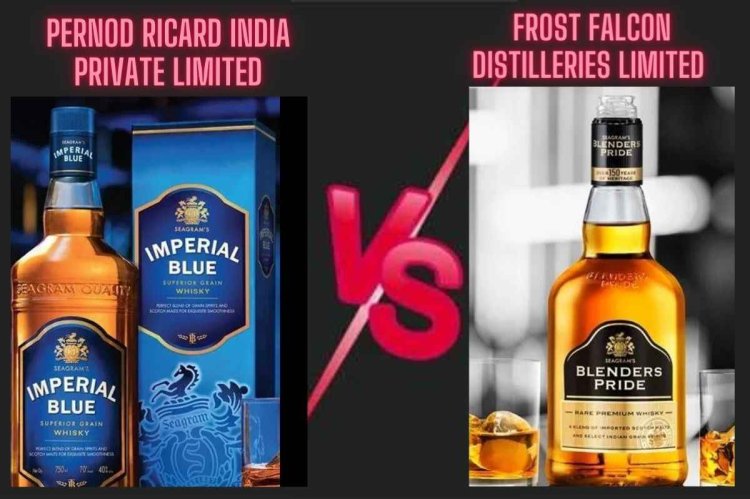Pernod Ricard India Private Limited v. Frost Falcon Distilleries Limited
The legal case of Pernod Ricard India Private Limited v. Frost Falcon Distilleries Limited revolves around trademark infringement and passing off concerning two products, "BLENDERS PRIDE" and "IMPERIAL BLUE," owned by the Plaintiff. The Defendant, Frost Falcon Distilleries Limited, used the trademark "CASINOS PRIDE," which the Plaintiff deemed confusingly similar. Both parties operate in the Indian Made Foreign Liquor (IMFL) segment, sharing the same customer base and distribution channels. The Plaintiff opposed the Defendant's application to register "CASINOS PRIDE" under Class 33, alleging trademark infringement and passing off. The Defendant argued that their mark was unique, imaginative, and legally adopted. The High Court of Delhi, after considering infringement and passing-off factors, ruled in favor of the Plaintiff, finding that the Defendant's use of "CASINOS PRIDE" constituted passing off the Plaintiff's marks. The Court prohibited the Defendant from manufacturing, marketing,

Pernod Ricard India Private Limited v. Frost Falcon Distilleries Limited
IA 2821/2021 in CS (COMM) 94/2021
Decided on 02.03.2022
FACTS
The case concerns two products of the Plaintiff, namely "BLENDERS PRIDE" and "IMPERIAL BLUE," both of which have registered trademarks under Class 34 and 33 of the Trademarks classification categories, respectively. The Plaintiff has been using the trademark "BLENDERS PRIDE" since 1995 and the trademark "IMPERIAL BLUE" since 1997.
On the other hand, the Defendant has been using the trademark "CASINOS PRIDE" since 02.08.2017, which the Plaintiff claims to be confusingly similar to their own.
The Plaintiff and the Defendant both belong to the Indian Made Foreign Liquor ("IMFL") segment, and they have the same customer base and are available from the same outlets.
The Defendant applied for registration of the "CASINOS PRIDE" trademark under Class 33, but the Plaintiff filed an application opposing it. The Plaintiff's opposition to the application was based on two main allegations against the Defendant.
PLAINTIFF’S CONTENTION
The Plaintiff in this case alleges that the Defendant infringed on their trademark by using the mark "CASINOS PRIDE" and attempting to sell their goods under the Plaintiff's name. The Plaintiff contends that the Defendant's product label, getup, packaging, colours combination, and feature arrangement were all deceptively similar to those of the Plaintiff's products. Additionally, both parties were operating in the same market sector, catering to similar customer demographics. The Plaintiff further argues that the presence of comparable features on different products could lead to customer confusion, potentially resulting in unfair competition and loss of business.
DEFENDANT’S CONTENTION
During the legal proceedings, the defendant argued that they had lawfully created and adopted the mark 'CASINOS PRIDE' on May 25, 2016. The defendant claimed that the term 'CASINOS PRIDE' was a unique and imaginative creation and that they had the right to use it exclusively. The defendant refuted the plaintiff's allegations by asserting that their products did not bear any similarity in terms of pronunciation, aesthetic appearance, or any other aspect. Moreover, the defendant argued that the plaintiff could not assert exclusivity for their composite mark 'BLENDERS PRIDE', which lacked any secondary meaning in the minds of the general public.
JUDGEMENT
The legal concepts of passing off and infringement are critical in safeguarding the interests of businesses and their products. Passing off is a product-specific tort where a defendant tries to pass off its product as the plaintiff's product. On the other hand, infringement is a mark-specific tort that aims to protect the mark. In other words, passing off focuses on the product, goodwill, and reputation it commands, while infringement aims to safeguard the mark.
In an infringement case, the court examines the marks involved, while in a passing-off case, the comparison is product to product. It means that the defendant will be committing the tort of passing off if there are enough factors that suggest that they are trying to pass off their product as the plaintiff's product.
The High Court of Delhi, after considering all the unique characteristics of infringement and passing off, concluded that the Defendant was passing off the Plaintiff's existing marks. Therefore, the Defendant was prohibited from manufacturing, marketing, or distributing the IMFL under the trademark "CASINOS PRIDE" by the Court.
CONCLUSION
In a recent legal case, the High Court of Delhi has declared Frost Falcon Distilleries Limited guilty of committing the tort of passing off. The case was filed by Pernod Ricard India Private Limited, who provided evidence that Frost Falcon's use of the trademark "CASINOS PRIDE" for their Indian-made foreign liquor (IMFL) products was in violation of Pernod Ricard's well-established trademarks, "BLENDERS PRIDE" and "IMPERIAL BLUE," as it created a deceptive similarity between the marks. As a result, the Court ruled in favour of Pernod Ricard and ordered Frost Falcon to stop using the "CASINOS PRIDE" trademark for their products.












